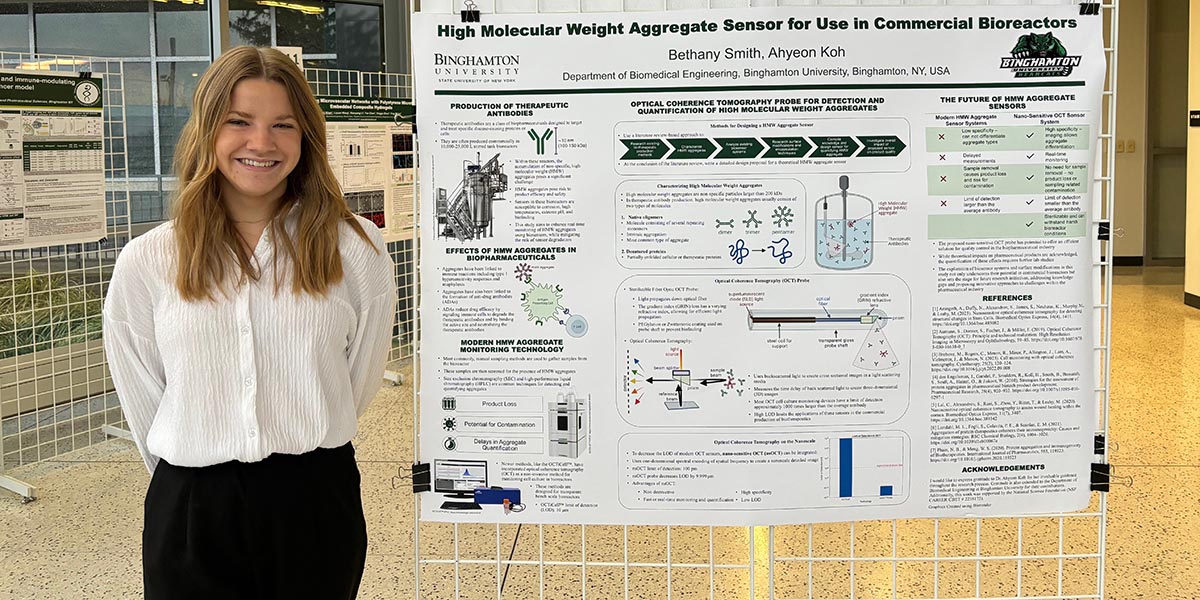Biomedical Engineering Department celebrates Research Expo, other spring 2024 successes

The spring semester at Binghamton University is nearly over, and Commencement ceremonies in May will celebrate this year’s graduates. The Department of Biomedical Engineering at the Thomas J. Watson College of Engineering and Applied Science continued to excel in education and research during the 2023-24 academic year.
Research Expo
The BME Department organized another successful Research Expo on March 15. The one-day student research event at the Innovative Technologies Complex was sponsored by our industrial partners, including Regeneron, QuidelOrtho, Krackeler Scientific, VWR and Fisher Scientific.
Department Chair and Distinguished Professor Kaiming Ye and Graduate Director and Associate Professor Guy German kicked off the expo. Alexander Steele, senior manager of university relations at Regeneron, delivered a keynote speech.
Postdoctoral researchers, graduate students and undergraduate students celebrated successes in biomedical discovery and technological innovations by taking the podium and creating posters to present their research in regenerative medicine, stem cells, 3D bioprinting, biomechanics, wearable biosensors, neuroengineering, organs-on-a-chip, drug release, bioimaging, nanobiomedicine, computational biology and more.
Ray Goodman won the Best Graduate Research Oral Presentation Award ($300) and Rachel Laytin won the Best Undergraduate Research Oral Presentation Award ($200). Bethany Smith and Daniel Lounshery won the Best Graduate and Best Undergraduate Poster Award ($100 each). A number of students won the second-place awards with certificates.
The expo fosters connections and brings together inspired students and faculty to ensure that our department remains at the forefront of innovation.
Research news
Donors Gary Kunis ’73, LHD ’02, and Connie Wong dedicated a new biomedical engineering lab in honor of their son, who died of brain cancer at age 33. The Douglas Hsu Research Laboratory will investigate therapeutic cancer vaccines through a genome-editing technology that converts a patient’s cancer cells into vaccines that mobilize their own immune systems to eliminate tumors.
Associate Professor Yuan Wan published research in the journal Nature Nanotechnology outlining a one-step process for immunoliposome manufacturing. Immunoliposomes can efficiently bind to antigens on tumor cell surfaces through their surface-targeting ligands, allowing tumor cells sufficient time to absorb chemotherapy medications.
Upstate Medical University and Watson College researchers have teamed up to study the underlying cause of hydrocephalus, a disorder where excess cerebrospinal fluid in the ventricles of the brain compresses brain tissue and causes a variety of physical and mental issues.
Assistant Professor Siyuan Rao moved her Neurobiological Interfaces Lab to Binghamton last fall. Rao and her students published research in Nature Methods about using hydrogel soft fiber devices to inhibit pain.
Student news
Ann Badia ’24 found a lot of support along the journey to her biomedical engineering degree, including the Educational Opportunity Program (EOP), the Collegiate Science and Technology Entry Program (CSTEP) and the McNair Scholars Program. She also was a Hispanic Scholarship Fund Scholar and a Reckitt Scholar.
PhD student Stefano Calabro, won a Graduate Teaching Excellence Award recognizing his significant contribution to the BME teaching program.
PhD candidate Joab Dorsainvil, MS ’23, is taking a lead role in research at Associate Professor Ahyeon Koh’s lab about using flexible papertronics for biomedical sensors.
Alumni news
Guru Madhavan, MBA ’07, PhD ’09, has published a new book called Wicked Problems: How to Engineer a Better World. In it, he focuses on what he calls the “synergistic six” of systems engineering — efficiency, vagueness, vulnerability, safety, maintenance and resilience — to discuss how wicked problems have emerged throughout history and how best to address them in the future.

